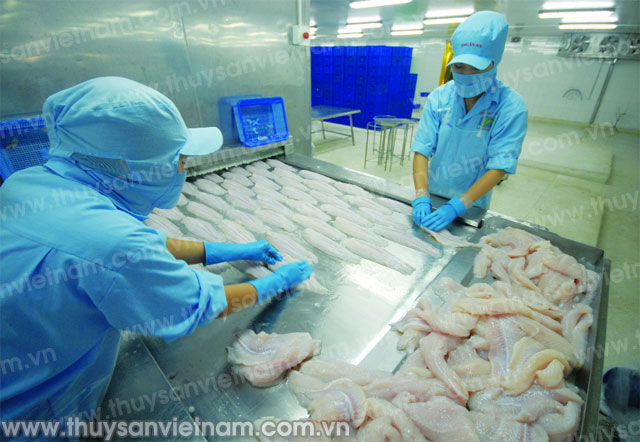It is the second time within five years Vietnamese Tra fish has been as an export to Russia, for the same reason: Food hygiene and safety. Russia is not the leading market of Vietnamese Tra fish but it has a great importance in the field.
Banned due to carelessness
At the end of December 2013, the Russian Veterinary Authority decided to impose a temporary suspension of import of Tra fish products and some other kinds of fish from eight Vietnamese businesses, which took effect from January 31st, 2014. The reason for this decision is that in December 2013, Russian Veterinary and Phytosanitary Surveillance Service (VPSS) made inspection trips to eight processing plants, two fish aquaculture farms and two laboratories, and conducted tests in eight Tra fish businesses in Ho Chi Minh city and the Mekong Delta, which exported the fish to Russia. It came to a conclusion that the process of Tra fish aquaculture in Vietnam has no control over the application of antibacterians for products. Several farms used antibiotics including banned ones without any organizations of quality insurance. Besides, another reason is that the transport condition and product testing in such Tra fish processing facilities are not yet standardized.
According to experts, this result is partly due to the unsustainable development of Tra fish products in recent time, leading to the lack of consistent control of antibiotics used in products. And there is also a concern that there will be many consequences to Vietnamese Tra fish farmers, processors and exporters after this suspension.

Vietnamese Tra fish will possibly return to the Russian market – Photo: Le Hoang Vu
… and subjectiveness
Vietnamese Tra fish appeared in international markets and quickly met consumer needs with its low price, leading to the rising consumption of this product. For many years, in the home market, Tra fish has been the second strategic product of the country’s fisheries because of the rapid development of the scale, output and its contribution to the sector.
However, it is this hastiness that results in many consequences. Many export processing plants have mushroomed. Many businesses have jumped in to export this kind of product; even some only do the final step-product distribution. The increase in exports leads to the increase of demand for raw fish and hence draws many people to Tra fish aquaculture.
This great development has led to many consequences, because many have tried to meet the need of quantity without paying attention to quality. Therefore, many Vietnamese Tra fish products have come up against a series of barriers, and the door to traditionally big markets is now closed. In order to sell products, they turned to other easy-going markets including Russia. The consequence is the distrust of this market in Vietnamese Tra fish and inevitably the suspension by this country. The effects of Russian refusal is not so small as the annual exports turnover that Vietnamese Tra fish businesses raked in from this country. Because it is refused in Russia, the product will never have opportunities to enter EU markets.
Better late than never
It is the second time Vietnamese Tra fish has been banned from coming to Russia. Although it perhaps does not have many effects on the aquaculture and export of this product, it is really an alarm on the recent practice of food hygiene and safety in the Tra fish products.
According to Nguyen Viet Thang, Chairman of the Vietnamese Tra Fish Association, the hasty development in the past years has driven Vietnamese Tra fish fall from the top position to serious losses in international markets. In addition, together with the non-strict management for quality of Tra fish output, many businesses and farmers have abused antibiotics and chemicals in order to get immediate benefits, causing residues in products. Since each market has different quality standards, it is inevitable that many businesses expanding their markets without noticing that this has been prohibited.
VASEP General Secretary Truong Dinh Hoe proposed an immediate solution that businesses in the suspension list have to solve problems warned Russia. At the same time, the two countries’ authorities should sit down together in order to remove this prohibition.
However, in the long run, the Vietnamese Tra fish industry needs to have strategies in order to change thoroughly, and the first and foremost is to make a comprehensive change, especially in aquaculture and exports in order to regain its image. Especially, in the current context of Tra fish facing more and more difficulties in its main markets, it is more important to be careful in smaller ones. This not only helps expand the markets for Tra fish, but also facilitates the production in the country to prosper again.
|
>> Statistics released by the General Departement of Customs indicated that Vietnam’s Tra fish export revenue to Russia had reached an estimated 44,1 million USD in 2013. |